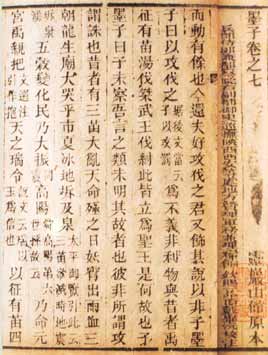Mozi
Mozi (Chinese: 墨子; pinyin: Mòzǐ; c. 470 – c. 391 BC), also known by his birth name Mo Di (墨翟), was a Chinese philosopher who lived during the Warring States period. He founded the school of Mohism, which argued against Confucianism and Daoism. Mozi's philosophies are recorded in the book also named Mozi, which contains his thoughts on a wide range of topics including ethics, logic, and science. His teachings emphasized universal love (jian ai), meritocracy, and the importance of practical, utilitarian solutions to social issues.
Life[edit | edit source]
Little is known about the life of Mozi. Historical records suggest he was born in what is now Tengzhou, Shandong Province. Unlike the aristocratic Confucius, Mozi came from a lower social class, possibly that of an artisan. His background influenced his philosophical outlook, which was distinctly more egalitarian than that of his contemporaries. Mozi traveled extensively throughout China to spread his ideas, engaging in public debates with followers of other schools.
Philosophy[edit | edit source]
Mozi's philosophy challenged the dominant Confucian ideals of his time. He criticized Confucian emphasis on ritual and music, arguing that these did not contribute to the welfare of the people. Instead, Mozi promoted a philosophy of universal love (jian ai), asserting that people should care for the well-being of others as much as their own. He believed this principle would lead to a more harmonious and prosperous society.
Universal Love[edit | edit source]
The concept of universal love was revolutionary in Mozi's time. He argued that partiality and favoritism caused social strife and conflict. By treating others with the same respect and care as one's own family, Mozi believed society could avoid conflict and injustice.
Meritocracy[edit | edit source]
Mozi was a strong proponent of meritocracy, arguing that leadership positions should be based on ability and moral integrity rather than birthright or aristocratic privilege. This was in direct opposition to the Confucian system, which often favored aristocratic lineage over competence.
Against Fatalism[edit | edit source]
Mozi also argued against fatalism, the belief that human efforts cannot change predestined outcomes. He believed that human action could influence the future and that it was important to act morally and with purpose to bring about positive change.
Impact[edit | edit source]
Mozi's teachings had a significant impact during the Warring States period, but his influence waned after the rise of the Qin Dynasty, which favored legalistic and Confucian doctrines. However, Mohism's emphasis on practicality and efficiency influenced later Chinese thought, including legalism and some aspects of Neo-Confucianism.
Despite being overshadowed by Confucianism and Daoism in later periods, Mozi's ideas have seen a resurgence in interest among modern scholars. His work is recognized for its insights into ethics, political philosophy, and its early advocacy of meritocratic governance and social welfare.
Works[edit | edit source]
The Mozi is the primary source of Mozi's teachings. The text is divided into several sections, covering topics such as ethics, government, and military defense. Unlike many other philosophical texts of the time, the Mozi is notable for its structured arguments and use of logic.
See Also[edit | edit source]
This article is a philosophy-related stub. You can help WikiMD by expanding it!
Transform your life with W8MD's budget GLP1 injections from $125
W8MD offers a medical weight loss program NYC and a clinic to lose weight in Philadelphia. Our W8MD's physician supervised medical weight loss centers in NYC provides expert medical guidance, and offers telemedicine options for convenience.
Why choose W8MD?
- Comprehensive care with FDA-approved weight loss medications including:
- loss injections in NYC both generic and brand names:
- weight loss medications including Phentermine, Qsymia, Diethylpropion etc.
- Accept most insurances for visits or discounted self pay cost.
- Generic weight loss injections starting from just $125.00 for the starting dose
- In person weight loss NYC and telemedicine medical weight loss options in New York city available
- Budget GLP1 weight loss injections in NYC starting from $125.00 biweekly with insurance!
Book Your Appointment
Start your NYC weight loss journey today at our NYC medical weight loss, and Philadelphia medical weight loss Call (718)946-5500 for NY and 215 676 2334 for PA
Search WikiMD
Ad.Tired of being Overweight? Try W8MD's NYC physician weight loss.
Semaglutide (Ozempic / Wegovy and Tirzepatide (Mounjaro / Zepbound) available. Call 718 946 5500.
Advertise on WikiMD
|
WikiMD's Wellness Encyclopedia |
| Let Food Be Thy Medicine Medicine Thy Food - Hippocrates |
Translate this page: - East Asian
中文,
日本,
한국어,
South Asian
हिन्दी,
தமிழ்,
తెలుగు,
Urdu,
ಕನ್ನಡ,
Southeast Asian
Indonesian,
Vietnamese,
Thai,
မြန်မာဘာသာ,
বাংলা
European
español,
Deutsch,
français,
Greek,
português do Brasil,
polski,
română,
русский,
Nederlands,
norsk,
svenska,
suomi,
Italian
Middle Eastern & African
عربى,
Turkish,
Persian,
Hebrew,
Afrikaans,
isiZulu,
Kiswahili,
Other
Bulgarian,
Hungarian,
Czech,
Swedish,
മലയാളം,
मराठी,
ਪੰਜਾਬੀ,
ગુજરાતી,
Portuguese,
Ukrainian
Medical Disclaimer: WikiMD is not a substitute for professional medical advice. The information on WikiMD is provided as an information resource only, may be incorrect, outdated or misleading, and is not to be used or relied on for any diagnostic or treatment purposes. Please consult your health care provider before making any healthcare decisions or for guidance about a specific medical condition. WikiMD expressly disclaims responsibility, and shall have no liability, for any damages, loss, injury, or liability whatsoever suffered as a result of your reliance on the information contained in this site. By visiting this site you agree to the foregoing terms and conditions, which may from time to time be changed or supplemented by WikiMD. If you do not agree to the foregoing terms and conditions, you should not enter or use this site. See full disclaimer.
Credits:Most images are courtesy of Wikimedia commons, and templates, categories Wikipedia, licensed under CC BY SA or similar.
Contributors: Prab R. Tumpati, MD






